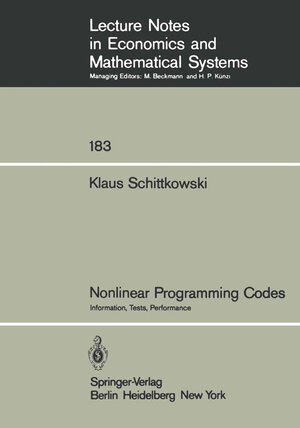
×
![Buchcover ISBN 9783642464249]()
Inhaltsverzeichnis
- I: Introduction.
- II: Optimization methods.
- 1. Line-search algorithms.
- 2. Quadratic programming.
- 3. Unconstrained optimization.
- 4. Penalty methods.
- 5. Multiplier methods.
- 6. Quadratic approximation methods.
- 7. Generalized reduced gradient methods.
- 8. The method of Robinson.
- III: Optimization programs.
- 1. Program organization.
- 2. Description of the programs.
- IV: The construction of test problems.
- 1. Fundamentals of the test problem generator.
- 2. General test problems.
- 3. Linearly constrained test problems.
- 4. Degenerate test problems.
- 5. Ill-conditioned test problems.
- 6. Indefinite test problems.
- 7. Convex test problems.
- V: Performance evaluation.
- 1. Notations.
- 2. Efficiency, reliability, and global convergence.
- 3. Performance for solving degenerate, ill-conditioned, and indefinite problems.
- 4. Sensitivity to slight variations of the problem.
- 5. Sensitivity to the position of the starting point.
- 6. Ease of use.
- 7. How to get a final score.
- VI: Conclusions, recommendations, remarks.
- 1. Pinal conclusions.
- 2. Recommendations for the design of optimization programs.
- 3. Some technical details.
- Appendix A : Numerical data for constructing test problems.
- Appendix B : Sensitivity analysis for the test problems.
- Appendix C : Further results.
- Appendix D : Evaluation of significance factors.
- References.



